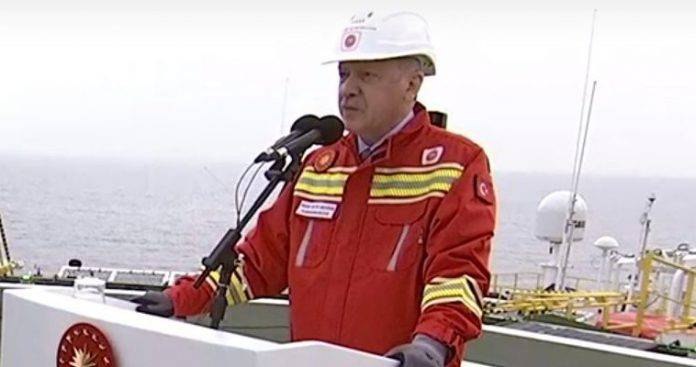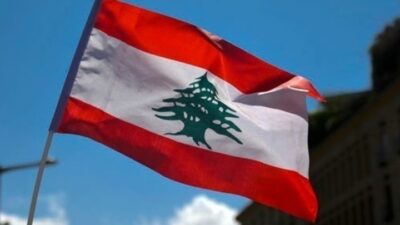Giorgos Adalis: Erdogan goes “fishing” for natural gas in the Black Sea – The myth of a super field
20/10/2020
On August 19, Erdogan made a puzzling statement! On 21 August, in a solemn atmosphere, he delivered an address to say that the Fatih drilling rig had discovered a huge gas field in the Black Sea, on the border of the EEZ with Bulgaria. He revealed that it was found on the Tuna-1 plot, at a depth of 4,525 meters and contains 320 bcm (billion cubic meters) of natural gas.
He even said that there are others in the area. Erdogan added that the discovery will be a game changer on the international chessboard for the benefit of Turkey. To understand the size of the deposit that Turkey is supposed to have discovered, we have to compare it with real deposits in the region.
It is five times larger than what has been found to date in the Black Sea and is the Neptun field off Romania, which is estimated to have 42-84 bcm of natural gas. The Romanian field is managed by ExxonMobil, which owns 50% and the rest is owned by Romania.
ExxonMobil, however, announced that it is leaving the area, due to the program of consolidation of its assets, which it came to after a decision of the banks that have lent it, before the coronavirus. It was clear that the efforts of ExxonMobil and the Romanians over the last five years could not bring the production curve to such levels that the field could become profitable.
Seeing that ExxonMobil is leaving the Black Sea but remaining in the Mediterranean, he told a huge lie about the volume of deposits in the Turkish EEZ, in order to persuade ExxonMobil to stay in the region, or at least delay its departure.
Because Tuna-1 has natural gas, but – according to experts – it is a fraction of the amount that Erdogan said! To date, Turkey has an offshore gas field in Akcakoca, which produces 0.3 bcm per year and its total stock is just 3.2 bcm. Now Erdogan wants to convince the world that Turkey is changing into the Qatar of Eurasia!
Erdogan’s lies
Energy giants are active in the Black Sea,. In Bulgaria, a consortium operates in the Han Asparuh field, in which TOTAL and the Spanish REPSOL participate. The consortium’s failure to make the field productive has recently forced Repsol to leave. Both the Bulgarian and the Romanian fields proved to be not very profitable, due to their great depth and the geological configuration of the area. The site of the Turkish well is about 100 km from the wells of the Bulgarians and the Romanians.
The geological problems faced by drilling rigs in Bulgaria and Romania are identical to those in Turkish waters. Another reason why Erdogan is lying about the size of the field is that Turkish Petroleum has worked with ExxonMobil and Shell in the region in the past. The existence of Tuna-1 has been known since 2007, but its reserves were estimated to be very small, at about one tenth of the amount that the Turkish president says. No foreign firm participated in Fatih’s research.
In other words, the estimation of the size has been undertaken only by the Turks. Surprisingly, because at such great depths, research requires the know-how of large multinationals to properly estimate size. Expertise that the Turks do not have to this day. As much as we researched, none of the well-known multinationals have a stake in the mammoth deposit they allegedly discovered.
One explanation for Erdogan’s move to this lie is that the debate on sanctions against Turkey was beginning in the EU at the time. Ankara invented the myth of the mammoth deposit in order to save time. If the size of the deposit was even half, it would be able to offset the negative climate for Turkey in Europe. Europeans are interested in such a deposit both in exploitation and as a source of supply, to reduce energy dependence on Russia.
Another reason Erdogan told this lie is the Turkish oligarchs. He may be predicting GDP growth, but the incomes of Turkish industrialists have plummeted, as has their allegiance to Erdogan. The standard of living of Turkish citizens has also dropped dramatically. It is economic growth that has kept Erdogan afloat for almost two decades. But he will not be standing for long, as it appeared from the result of the municipal elections.
Energy “myth” and contracts
To alleviate the crisis at home, the Turkish president is provoking crises with Greece, Cyprus, Syria and Iraq. That is why the operation was carried out in Libya and Nagorno-Karabakh. That alone is not enough to keep him in power for long. If he loses the support of the oligarchs he will soon fall.
He thus creates the myth of a Turkey with huge gas reserves, in order to continue to keep the oligarchs and the voters tied to his chariot. However, it also targets those who draw up long-term energy plans. Turkey’s total contracts for the period 2020-21 were of the order of 24 bcm of natural gas. Of these, 8 bcm pass through the pipeline of the Russian firm Gazprom.
This means that after 2023, when it is supposed to extract gas from Tuna-1, it will greatly reduce Gazprom’s revenues and automatically bring at least $ 3 billion in foreign exchange to the Turkish economy per year. Amount that will constantly increase. In other words, he strikes at the center of the problem he is facing, that is, the great devaluation of the Turkish lira and appears as a savior.
Erdogan tells Europeans that “Greece and Cyprus should not be pampered“! This strikes a chord with the EastMed pipeline. He tells them indirectly but clearly that they do not need to invest 8-10 billion in EastMed, since with Tuna-1 he can cover them directly with cheaper natural gas. He even refers to the S-400 as a guarantee for the safety of the field and the companies that will be involved.
The story is a page out of the “Thousand and one Nights”! It seems, however, that Erdogan manages to “sell” it both in Europe and in America. And so he gains what he is really desperately looking for: extra political time to survive in power for another 2-3 years. He needs this time to carry out his plans in the area. Because he realized that the Tuna-1 propaganda was over, he also changed the name of the field. It is rather out of place for a hydrocarbon field to be called Tuna!
Thus, from 2021 it iwill be renamed Sakarya (in Greek the river Sangarios and homonymous province). The name Sakarya is a message with double symbolism! First, it reminds Greece of the defeat at this site and the Asia Minor disaster. Secondly, to send the message to the Turkish people that they will be able to reverse the negative developments, as they then did.





